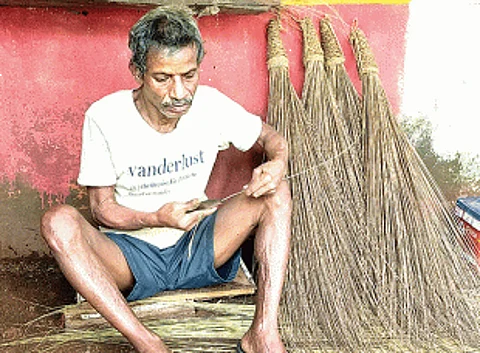

PONDA: In today’s digital age, many traditional occupations have faded into obscurity as readily available, mass-produced products dominate the market. However, in rural areas, some artisans remain dedicated to preserving their local professions. One such craftsman is Sonu Gaonkar, a 70-year-old
resident of Satermal-
Nirankal, who specialises in handcrafting traditional brooms from coconut leaflets.
Sonu Gaonkar has never worked a conventional 9-to-5 job. Instead, he has provided for his family exclusively through the craft of making brooms. His dedication to this traditional profession extends to his wife, whom he has also trained in broom-making. Together, they have raised three children while earning a reputation for crafting reliable brooms.
Their work is in such high demand that they receive advance orders for their products. While Goa is renowned as a global tourist destination, a significant portion of its population resides in rural areas where coconut brooms remain popular due to their durability.
Creating coconut brooms is a physically demanding task that involves a multi-step process. First, coconut pinnate leaves are collected, and their leaflets are separated. Then, the sticks are cleaned and left to dry for approximately two days. Once the sticks are sufficiently dry, they are meticulously handwoven into brooms, with each broom requiring between 200 and 300 leaflet sticks.
Sonu, reflecting on his craft and its importance, shares his wisdom, “If you give your all in whatever you do, satisfaction is guaranteed. Although I’ve aged now, I still make around 300 brooms a year. We are located in a rural area, so we sell one broom for Rs 200. There
is a need for more people to retain local occupations.”
In an age of rapidly changing technology and mass production, individuals like Sonu Gaonkar serve as a testament to the enduring value of traditional craftsmanship and the preservation of local trades.